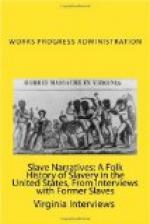Mr. Whitted’s uncle belonged to a mean master. The slaves worked hard all day, then were chained together at night. The uncle ran away in the early part of the war, and after two years broke through the lines, and joined the northern army, going back after emancipation.
Iris Cook
Dist 4
Floyd Co.
Slave story
the story of Alex Woodson
905 E. 4th St.
New Albany, Ind.
Observation of Writer
Alex Woodson is an old light skinned darkey, he looks to be between 80 and 85, it is hard to tell his age, and colored folks hardly ever do know their correct age. I visited him in his little cottage and had a long talk with him and his wife (his second). “Planted the fust one.” They run a little grocery in the front room of the cottage. But the stock was sadly run down. Together with the little store and his “pinshun” (old age pension) these old folks manage to get along.
Alex Woodson was born at Woodsonville, in Hart County, Kentucky, just across Green River from Munfordville. He was a good sized boy, possibly 7 years or more when “Freedom wuz declared”. His master was “Old Marse” Sterrett who had about a 200 acre place and whose son in law Tom Williams ran a store on this place. When Williams married Sterretts daughter he was given Uncle Alex and his mother and brother as a present. Williams was then known as “Young Master.”
When war come Old Master gave his (Woodson’s) mother a big roll of bills, “greenbacks as big as Yo’ arm”, to keep for him, and was forced to leave the neighborhood. After the war the old darkey returned the money to him intact.
Uncle Alex remembers his mother taking him and other children and running down the river bank and hiding in the woods all night when the soldiers came. They were Morgan’s men and took all available cattle and horses in the vicinity and beat the woods looking for Yankee soldiers. Uncle Alex said he saw Morgan at a distance on his big horse and he “wuz shore a mighty fine looker.”
Sometimes the Yankee soldiers would come riding along and they “took things too”.
When the War was over old Master came back home and the negroes continued to live on at the place as usual, except for a few that wanted to go North. Old Master lived in a great big house with all his family and the Negroes lived in another good sized house or quarters, all together. There were a few cabins.
“Barbecues! My we shore used to have ’em, yes ma’am, we did! Folks would come for miles around. Would roast whole hawgs and cows, and folks would sing, and eat and drink whiskey. The white folks had ’em but we helped and had fun too. Sometimes we would have one ourselves.”
“Used to have rail splittin’s and wood choppins. The men woud work all day, and get a pile of wood as big as a house. At noon they’d stop and eat a big meal that the women folks had fixed up for em. Them wuz some times, I’ve spent to many a one.”




